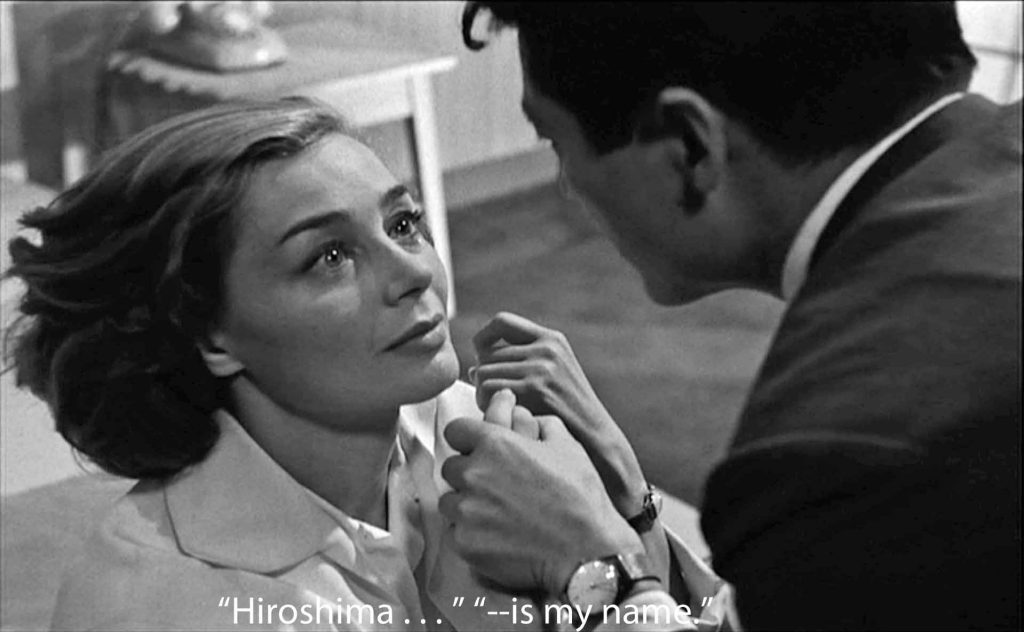Classic Movies: Hiroshima Mon Amour (1959)

Directed by Alain Resnais, Hiroshima Mon Amour(1959) was one of the most powerful and controversial films of the post-WW2 era.
The film itself was the grand topic of the Cannes Film Festival in 1959. The movie denounced by both the right and the left. Their denouncement reflects the postwar political mentality of choosing aside. And if the topic at hand is not fit for either of them, then it should be buried. Many critics however said this exactly shows what the movie trying to do. Because Hiroshima Mon Amour is not about defending one side, but about showing the consequences of group mentality. Moreover, the movie also mentions several controversial topics, especially for the French audience. Apart from the Hiroshima bombing, the Casablanca reference, Colonialism, and French collaboration and purges after WW2 are all in the movie. These events are very recent and hard to talk topics. Especially in France.
Why the uneasiness for French?
France was an interesting country after WW2, while there were many purges and reflections towards it. Many events left unspoken. French had amnesia in the media about WW2 and shortly afterward. On the contrary, Hiroshima Mon Amour puts the images and the events right in front of the people, to make them remember and make them talk about it. This can be seen in how Elle does not want to talk about her past as a French actress. Lui also does not want to share his side of the story. But there is a slight difference, as Lui describes himself as Hiroshima, Elle escapes her roots and her past. This can even be decoded as the two mentalities of France and Japan after WW2.

Elle and Lui in Hiroshima Mon Amour(1959) are also interesting because Elle and Lui are reflective symbols in their own countries. What Elle sees in Hiroshima is acceptance and people do not afraid or escape to talk about the past, while Elle is constantly avoiding talking about the past and talking about France in general.
Marguerite Duras, the scriptwriter says “One can talk about Hiroshima only by not talking about Hiroshima.” to avoid showing horror. This is true, the movie is in Hiroshima, but not talking about Hiroshima. Which is another symbolism for post-WW2 France.
The Subreading of Hiroshima Mon Amour
In the beginning, Lui says “You saw nothing in Hiroshima” showing the impossibility of understanding historical events. There are always two sides of the story and this is true for both Lui and Elle. The movie is constantly against the “tourist” perspective on historical events. Whether it’s Hiroshima, Auschwitz or anything else.
We see a sudden shift from Hiroshima to Nevers, initiated by Lui who himself refuses to tell his story. This is the pinnacle of the movie. In 1959, as a French person, you go to the cinema to see a movie about Hiroshima, a romance movie and also a touristic reflection of Hiroshima. Yet, what you see is Nevers, purges, and the horrors you wanted to erase from the memories. Like Elle having a hard time remembering those hard times, Hiroshima Mon Amour forces the audience to remember the pain and the struggle and not escape from it.
Overall
In the end, her story is a painful narrative. Painful return is a sign of faithfulness to the past. Hiroshima revives her pain, but also a fear of forgetting once she remembers everything. As Elle does, the movie pushes France to remember and embrace the pain. Even more importantly, not domesticate that pain, share it, as others have their own pain too. As the form and style of the film, invoking the past by obstructing its portrayal is the major aspect of the movie. From absences, silences, slowness, the movie is far away from a positive romance movie.

Elle remembering her German lover as a French girl during WW2
To reflect on the issue of representation: memory can fail, historical events are always reconstructed and represented, a clear indication of manipulation. As in the movie Elle and the French crew making a movie about Hiroshima, which is far from the real events and the reality. In this aspect, Hiroshima Mon Amour is also criticizing many war movies after WW2 as most of them are manipulation rather than reality.
The movie is clearly an antiwar movie. It does not differentiate good vs. bad, because all parties are bad.
Can there be any other movie like Hiroshima Mon Amour? A movie sparked so many controversies in its own country, while discredited by every political side for simply showing the past and make them remember the pain, so they can move on better.
Sources:
Kaplan, B. A. (2021). Too painful to forget, too painful to remember: Ashes of memory in Marguerite Duras and Alain Resnais’s Hiroshima mon amour (1959) and Duras’s La douleur (1985). Memory Studies. https://doi.org/10.1177/1750698020988773
Tester, K. (2015). Hiroshima: Remembering and forgetting, everything and nothing. Thesis Eleven, 129(1), 27–39. https://doi.org/10.1177/0725513615592976
Personal analysis







